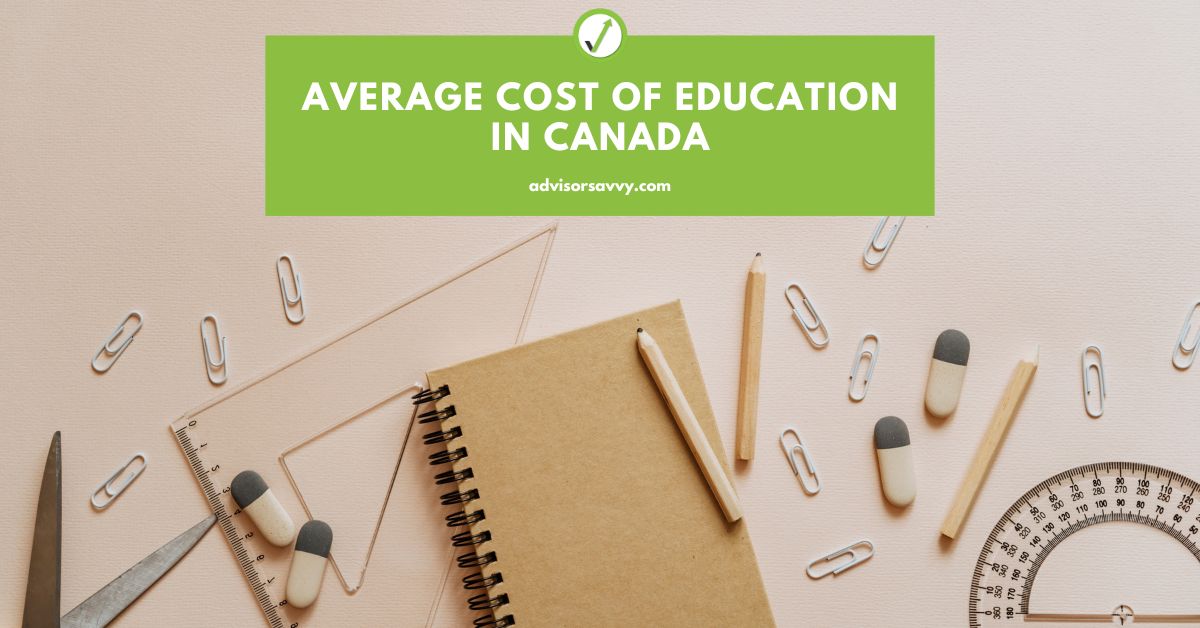
Canada is known for its world-class education system. It has diverse academic programs that attract students from around the world. The average cost of education in Canada is taken into consideration for both domestic and international students. To have successful academic outcomes, students and their families require this information. Education costs include tuition fees, books, living expenses, travel costs, and so on.

Table of contents
- Is education in Canada free?
- CIBC Investor’s Line Offer
- Do Canadians pay for college?
- How much does Canadian education cost per year?
- Cost of Private Education
- Average Cost of Post-Secondary Education in Canada
- Average Cost of Master’s Education in Canada
- Average Cost of Ph.D. Education in Canada
- Do parents have to pay for college in Canada?
- Managing the Cost of Education in Canada
Tuition fees vary significantly across Canada and other parts of the world. It is determined by the institution, program of study, and level of education. Often, the province or territory the tuition is being charged in affects the price. Further, there are different fee structures for domestic and international students. Additionally, living costs, including accommodation, meals, transportation, and personal expenses, are part of the overall cost of education. Understanding the financial aspect of education is essential for students. Keep reading to learn more!
Related Reading: Financial Planning Tips For Students And Young Professionals
Is education in Canada free?
Education in Canada is not entirely free. Elementary, middle and high school education is publicly funded (Kindergarten through to Grade 12). This means Canadian citizens and permanent residents can access free schooling at these levels.
CIBC Investor’s Line Offer
Up to $6.95 per online stock or ETF trade. Plus, there’s no minimum account balance.
On the other hand, post-secondary education is not free. In other words, college and university education costs money. Though significant government funding for domestic students exists, there are still tuition fees. The cost varies depending on the province, institution, and program of study. Canadian citizens and permanent residents enjoy lower tuition fees. Although, international students face higher educational costs.
Even though higher education isn’t free, Canada provides support. There are various financial aid options, scholarships, and grants. All are designed to help alleviate the financial burden for students. Canada has a strong commitment to accessible education. It ensures a range of support for students pursuing higher learning. They also ensure a baseline of primary and secondary education for their citizens.
Do Canadians pay for college?
Colleges and universities in Canada are not free. Canadian citizens and permanent residents benefit from lower tuition fees. However, they still pay significant amounts of money. Further, their international student counterparts pay even more. Tuition fees are a significant component of the overall expenses associated with education. They can range from a few thousand to tens of thousands of dollars per year.
There are financial aid options and government student loans to assist with these costs. Students must research the cost of the schools and programs they are interested in. Further, they must research the cost of living in the community where the school is located.
Related Reading: Best Student Discount Programs
How much does Canadian education cost per year?
The cost of education in Canada varies widely. It depends on the level of study, type of program, and the institution. On average, for undergraduate programs, tuition fees range from:
- Canadian citizens and permanent residents: $7,000 to $25,000 per year
- International students: $20,000 to $40,000 or more per year
Graduate programs tend to have higher tuition fees. This includes master’s and doctoral degrees. Moreover, these figures are estimates and can fluctuate. Each specific program and the university or college attended, heavily determines exact costs. Students and families should additionally consider living expenses. Accommodation, food, transportation, and personal items contribute to the cost of education.
Related Reading: How to Make Money in Canada as a Student
Cost of Private Education
Private educational institutions, including private schools and universities, often have higher tuition fees compared to their public counterparts. For private elementary and secondary schools, tuition can range widely from a few thousand to tens of thousands of dollars per year. Ultimately determined by the specific school, its services, amenities, reputation, facilities, and location.
Our Kids is a Canadian resource that helps explore private school options. Often many private primary and secondary schools cost significantly more than university undergraduate degrees. This is not always the case, as there are more affordable options, especially in the primary years. These years of education offer more private institutions and more competitive pricing.
It’s important for parents and students to carefully review the fee structures. Each school has costs that can vary significantly. Additionally, some schools may have additional charges. These charges can be for uniforms, textbooks, and other specific activities. Further, if you are considering boarding schools, these private schools will cost significantly more. As an example, we can look at a private school in Toronto:
Upper Canada College – Senior Kindergarten to Grade 12
- Tuition fees for the Day program: $36,750 – $39,900 per year
- Tuition fees for the Domestic Student Boarding program: $66,620 – $68,190 per year
- Tuition fees for the International Student Boarding program: $70,298 – $71,875 per year
As mentioned, private schools’ tuition fees vary greatly. Here is a more reasonably priced Winnipeg private school:
Balmoral Hall School – Preschool to Grade 12
GRADES PRESCHOOL TO GR. 12
- Tuition fees for the Day program: $15,450 – $19,210 per year
- Tuition fees for the Domestic Student Boarding program: $38,625 – $49,440 per year
Again, there can be even more affordable options, such as a Montessori private school. Ultimately the location, type of school and reputation will determine the tuition costs.
Average Cost of Post-Secondary Education in Canada
Tuition fees for Canadian citizens and permanent residents at public universities range. It can be as low as $7,000 or as high as $25,000 per year for undergraduate programs. International students, however, face higher tuition costs. Ranging from $20,000 to $40,000 or more annually. The cost varies depending on the province, institution, and program of study.
Overall, the national average for tuition fees is $7,076/year for domestic students. This national average soars to $38,081/year for international students. Ultimately your province of study plays a huge role in the tuition fees.
Here is a list of provincial/territorial averages for undergraduate yearly tuition fees:
- Nova Scotia – $9,575
- Saskatchewan – $9,232
- New Brunswick – $8,706
- Ontario – $8,190
- Alberta – $7,586
- Prince Edward Island – $7,381
- British Columbia – $6,383
- Manitoba – $5,386
- Yukon – $4,275
- Newfoundland and Labrador – $3,481
- Quebec – $3,461
It is important to note these are the average costs for tuition alone. Other educational costs must be taken into consideration as well. These include basic costs of living while studying. Maclean’s offers a great and informative article on this; The cost of a Canadian university education in six charts. They have determined the total national average for post-secondary education in Canada is $19,498.75. This includes rent, tuition, groceries, food on campus, travel costs, books, and extracurriculars. The article further provides infographic charts that further break down the most costly programs.
Using this Universities Canada tool, you can find Tuition fees by university. Universities Canada helps connect universities, faculties, and students. It allows for significant information in one place. It can help you plan your educational future while keeping cost in mind. The provided tool offers the average cost for many Canadian universities. Divided into categories like undergraduate studies, domestic and international, graduate studies, and more. You can search by province or university name.
Average Cost of Master’s Education in Canada
The average cost of a master’s degree in Canada varies. The cost differs depending on the province, institution, program of study, and international/domestic status. On average, domestic students pursuing a master’s degree can expect to pay tuition fees of $7,000 to $35,000 per year. International students pursuing a master’s degree face higher tuition fees. Tuition costs for international master’s students can range from $15,000 to $45,000 or more per year.
Overall, the national average for graduate tuition fees is $7,573 per year for domestic students. This national average reaches $22,061 per year for international students. Ultimately your province of study plays a huge role in the tuition fees.
Here is a list of provincial/territorial averages for graduate yearly tuition fees:
- British Columbia – $10,748
- Nova Scotia – $10,548
- Ontario – $9,445
- Alberta – $7,879
- New Brunswick – $7,448
- Prince Edward Island – $5,805
- Manitoba – $5,742
- Saskatchewan – $5,276
- Quebec – $3,633
- Newfoundland and Labrador – $3,228
While these are averages, the school of study and program of study play huge roles in tuition fees. Graduate programs that carry the highest cost are typically executive MBA and regular MBA programs. Executive MBA can cost domestic students $45,596 and international students $68,224. It is important to note these are the average costs for tuition alone. Other educational costs must be taken into consideration. These include basic costs of living while studying.
Average Cost of Ph.D. Education in Canada
The average cost of a Ph.D. in Canada varies. Often Ph.D. programs are funded programs. While a university may charge you a “tuition fee” so long as you are researching, teaching, or working for the university this fee comes out of your funding. Many universities in Canada offer amazing Ph.D. funding or stipends. Your tuition fee or amount of funding available is determined by the university, program, and area of study.
For domestic Ph.D. students, tuition fees range from $2,000 to $10,000 per year. As mentioned the tuition fee is largely determined by admission and funding. Many Canadian universities offer lower tuition rates for domestic students. In many cases, they may waive tuition for Ph.D. candidates. So long as they have secured research or teaching assistantships.
International Ph.D. students, on the other hand, generally face higher tuition fees. The annual tuition for international Ph.D. students is $7,000 to $30,000 or more. Funding opportunities are also available for international students.
Ph.D. programs are highly specialized and as such universities determine their cost. It is best to contact the universities and departments you would like to pursue a Ph.D. This will allow you to fully understand the financial aspects involved. This would include payment obligations and funding opportunities.
Here is information on heavily funded Ph.D. programs, studies, and schools. It is important to note these are the average costs for tuition alone. Other educational costs must be taken into consideration. These include basic costs of living while studying.
Do parents have to pay for college in Canada?
The responsibility for paying for college or university falls on the student. While parents can choose to contribute to their child’s education, they are not obligated legally. Many parents do help where they can in Canada, especially if they can afford to do so.
Students in Canada have various options for financing their education. This includes government student loans, grants, scholarships, and part-time employment. The government provides financial assistance programs to eligible students. This is typically provided through Provincial and Federal partnership programs like OSAP. Here is more information on government-supported student aid. Further here is each provincial and territorial student aid office.
The decision to contribute financially to a child’s education is often a personal one. It depends on the family’s financial situation and values. Some families may choose to cover the entire cost. Other families expect their children to contribute through part-time work, loans, or other means. Many families plan and get their children an RESP.
It’s important students talk with their families about finances. They need to know what level of support they can expect while pursuing higher education. This will help them create a manageable plan, given the support they may or may not have.
What is the average amount in RESP?
RESPs are tax-advantaged savings plans designed to help save for a child’s education. Typically initiated by a parent, RESPs can have funds invested by relatives, guardians or family friends. The funds are contributions held for a child’s future post-secondary education expenses. The Canadian government provides grants, such as the Canada Education Savings Grant (CESG) and the Canada Learning Bond (CLB), to encourage contributions to RESPs.
The amount held in each RESP varies, depending on the age of the child and the amount contributed. Here are some quick stats:
- The average amount held in a RESP for someone 18 or older was $20,505.
- In 2021, the average RESP withdrawal per beneficiary was $10,359.
- In 2022, 56.4% of eligible children received government contribution in a RESP.
For more stats and facts on RESPs read: Canada Education Savings Program: 2022 Annual Statistical Review.
What percentage of parents pay for college in Canada?
The amount of support parents offer their children in paying for secondary education varies. It is determined by resources available and family values. A study by the Bank of Montreal found 45% of parents would support their child with 50-100% of their children’s future education costs. While 65% had opened RESP in their children’s names to help with education costs.
The study shows that the majority of parents try to help their children with education costs. This does not mean children can depend entirely on their parents. Often, they need to rely on student loans, personal savings, and scholarships to make up the difference. When they cannot make up the difference, they may need to work and pay their way through schooling.
How much do most parents save for college?
Canadian parents in large numbers say they would and believe they should support their children’s higher learning. The average RESP in Canada is $20,505 by the time a child reaches 18. This may not be the only source of savings or support they have for their children. It is however the best number to illustrate how much money parents save for their children’s education.
Should I pay for my kid’s university?
Deciding whether to financially support your child’s university education is a personal choice. Consider your financial standing, and make sure their education won’t compromise essential needs. Talk to a financial advisor on how to balance priorities. Engage in open communication with your child about expectations and financial realities.
If you save through RESPs, it can significantly aid educational expenses and potentially attract government grants. Assess your child’s career goals, will they be headed into trades or higher learning? Discuss all financial aid options available, and what support you can and would like to offer. If your family values place a high priority on supporting higher education, help where you can. Being present emotionally and financially as your child navigates this part of their life is important.
Managing the Cost of Education in Canada
Fortunately, an educational foundation is free in Canada. But if you want to pursue higher education past grade 12, it will cost you. The Canadian government does what they can to support the educational growth of the nation, but the entire process can strain your wallet. If education is something that’s important to you, be sure to create a budget and learn from financial mistakes while you’re young. It will only benefit you once you enter the workforce!
If you find that the cost of education is extreme and unattainable for you, maybe pursuing college or university isn’t the right move for you. In fact, the younger generation is creating a trend of NOT pursuing higher education due to the disproportional cost. Plus, the ability to earn a reasonable annual income through other means that do not require a degree. If the cost is too much for you, chances are you can have a lucrative career through other means, you just have to get creative!
Read More: Types of Investment Accounts in Canada

